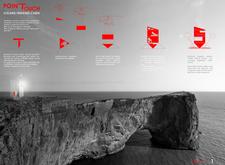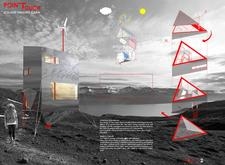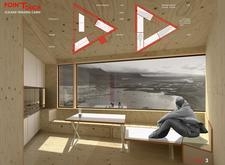5 key facts about this project
**Overview**
The POINT TOUCH Trekking Cabin, located in Iceland's rugged landscapes, addresses the architectural needs specific to remote natural environments. The design prioritizes functionality and environmental stewardship, reflecting a commitment to sustainable practices while enhancing user engagement with the landscape. The project's core philosophy promotes minimal disturbance to the natural setting, integrating built form with its surroundings through thoughtful design and material choices.
**Spatial Configuration and Modularity**
The cabin's layout features angular triangular modules, each dedicated to specific functions, such as sleeping, living, and communal spaces. This modular approach not only allows for efficient use of space but also facilitates adaptability in response to varying user needs and environmental conditions. The sleeping module accommodates multiple beds with an efficient design for trekking groups, while the living module fosters social interaction with essential amenities. Structural braces provide stability and minimize the impact on the ground, enhancing the cabin's overall sustainability.
**Material Selection and Energy Solutions**
A commitment to sustainability is evident in the choice of materials, which include steel for durability, glass for natural light, and plywood for warmth and a natural aesthetic. Renewable energy systems are integral to the cabin's design; solar panels and wind turbines work in tandem to ensure energy independence. Additionally, a rainwater collection system contributes to resource efficiency, further supporting the cabin's self-sufficient approach. The carefully selected materials and energy systems work cohesively to promote ecological harmony while providing comfort and functionality for users.























































